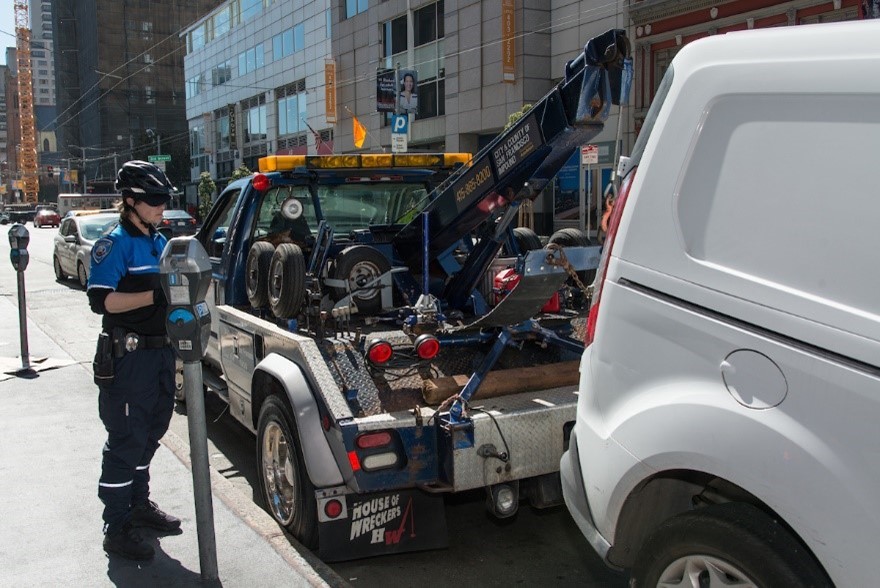
The sight drivers never want to see.
You’re walking to your car, ready to jump in, when you look around and get a sinking feeling in the pit of your stomach. The car is not where you left it. Have you forgotten where you parked? Has it been stolen?
And then you realize that it has been towed.
At the SFMTA, we understand that retrieving a towed vehicle is expensive and inconvenient. You’re charged towing and administration fees, and if your car is at the impound lot for more than four hours, you are responsible for storage costs, as well. However, it’s important to remember that San Francisco streets are a shared public space, not anyone’s private parking spot.
SFMTA parking control officers may tow vehicles that cause a hazard or block transit lanes, fire hydrants or driveways. Towing when it’s necessary keeps our streets safe and accessible to everyone, but ultimately, the SFMTA wants to help people avoid having their cars towed. That is why we often issue warnings and citations before resorting to towing. We also launched the Text Before Tow program in January 2022 to let people know if their car is about to be towed for certain violations.
Tow-Fee Waivers for Low-Income and Unhoused People
We recognize that some vehicle owners may not be able to afford the administration and tow fees, and it would be unfair to burden them further or put them at risk of losing their cars simply because of financial constraints. That's why we have programs that help low-income people retrieve towed vehicles.
There is a significantly reduced towing fee for eligible low-income people, and storage fees are waived for up to 15 days. This gives people time to gather the necessary funds. In the case of unhoused people, the financial situation can be even more challenging, and we believe in providing support, not making things even harder. This is why, for eligible vehicle owners experiencing homelessness, all administration and tow fees are waived the first time their vehicle is towed. Storage fees also are waived for up to 30 days.
It is important to note that if a vehicle owned by someone who is unhoused is towed more than once, they receive the same fee and storage waivers as other low-income people.
Towing Vehicles Used as Housing
The SFMTA takes a cautious approach when it comes to towing vehicles that may be used as a living space. We understand that towing these vehicles can result in the loss of personal belongings, essential medications, and potentially the homes of those who are already in vulnerable situations. That is why our parking control officers have a policy of exercising restraint when they come upon vehicles that may be inhabited.
We also work closely with the Department of Homelessness and Supportive Housing (DHSH) and the Healthy Streets Operations Center (HSOC) to support people living in their vehicles. Our goal is to connect them with health care services and alternative housing options. At the same time, we have an obligation to manage the limited curb space San Francisco has, especially when we receive complaints.
If a vehicle has been parked in the same spot for an extended period, the owner may receive what traditionally has been a 72-hour warning to move that vehicle. Our parking control officers will determine whether the vehicle is occupied or appears to be used for shelter. If that is the case, they will try to let the owner or occupants know about programs that can help prevent the vehicle from being towed.
While the usual practice is to tow the vehicle three days after the warning has been issued, the SFMTA currently offers an additional two-day grace period. On top of that, owners can request an additional five days if needed. If a vehicle used as housing eventually is towed, the SFMTA will inform the owner of their rights and offer guidance on how they can retrieve their belongings.
It’s important to understand that the SFMTA is not the only agency responsible for managing parking in the city. The San Francisco Police Department may also call for a vehicle to be towed. In that case, only the SFPD can authorize the release of the vehicle or grant the owner access. Additionally, state laws may also prevent the SFMTA from releasing a towed vehicle back onto the road.
The SFMTA has implemented the nation’s most comprehensive program to provide the most vulnerable populations relief from certain costs related to parking citations and towing. We have an obligation to manage the streets, and calling for a tow when it’s warranted helps us do that.
You can learn more at Waivers for people experiencing homelessness or low-income and reduction for first time tow (SFMTA.com/FirstTow) or Text Before Tow Program (SFMTA.com/TextBeforeTow).